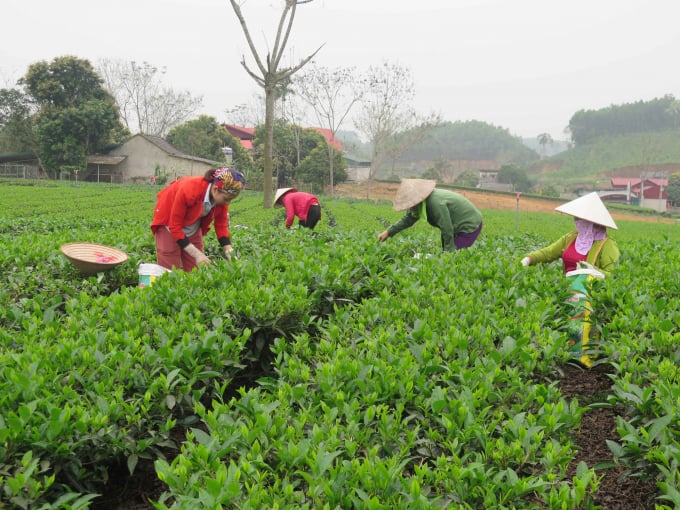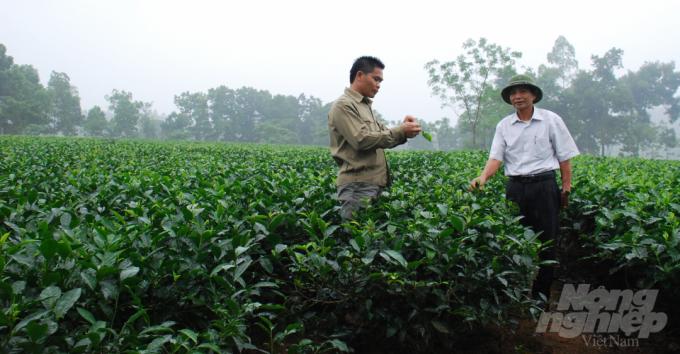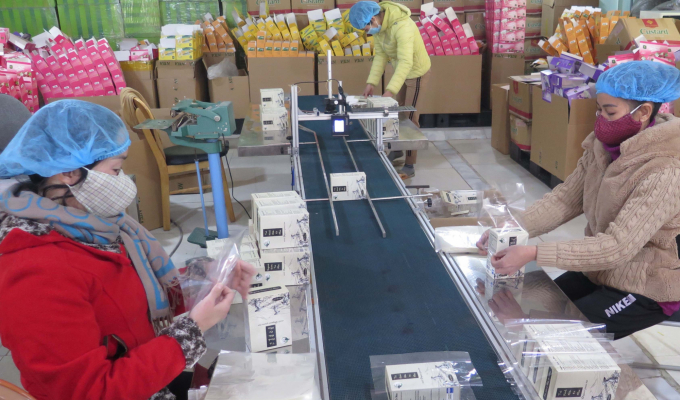June 18, 2025 | 23:35 GMT +7
June 18, 2025 | 23:35 GMT +7
Hotline: 0913.378.918
June 18, 2025 | 23:35 GMT +7
Hotline: 0913.378.918

Harvesting tea in Phu Do commune (Phu Luong district, Thai Nguyen province). Photo: Dong Van Thuong.
Ms. Dao Thi Thoi, Head of the Chinh Phu Organic Tea Production Cooperative Group, Phu Xuyen Commune, Dai Tu District, participated in the study that serves as the core to implement the integrated pest management (IPM) on tea trees from the very beginning.
The IPM skills and methods have helped her become a Tea Cooperative Director, the leader of the organic tea production group following the 11041 standards. One of the IPM principles that have captured her interest the most is the protection of pest’s natural nemesis.
On the tea fields, spiders that eat stink bugs and planthoppers are tea grower's friends, protecting them means protecting the tea plants. At that time, tea growers will not have to use harmful pesticides and worry about the risk of food insecurity. The biggest advantage is that the tea price is always high, and the ecology of tea fields, the health of tea makers and those who use tea products are guaranteed.
IPM on tea plants creates great effects and benefits, but from 2015 onwards, the application of IPM in tea production in Thai Nguyen has not been prioritized as separate programs, but only integrated into other models.

Tea growers in Thai Nguyen have made very positive changes in their production mindset after approaching IPM. Photo: DT.
It can be seen that Thai Nguyen had soon realized the risk of tea plantation recession. Consolidation and rectification of tea production and trading activities through successive schemes on tea has brought Thai Nguyen tea plants, tea products and tea makers to a gradually higher position.
Thai Nguyen is determined to expand the area of safe tea production according to GAP and organic standards in concentrated tea areas. Tea has been selected as a key crop to continue attaining mechanisms and policies to support sustainable development and increase added value.
As shared by Mr. Nguyen Ta, Head of the Plantation and Plant Protection Department of Thai Nguyen province, the application of IPM on tea plants in Thai Nguyen has created a breakthrough effect, serving as a foundation for the implementation and approach safe production procedures.

Packaging tea at NTEA Vietnam Co., Ltd. Thai Nguyen branch. Photo: DV.
According to Ms. Nguyen Thi Nga, Chairwoman of Thai Nguyen Tea Association, the Association is implementing a scientific thesis on traceability and growing area codes for tea products. That will be the basis for Thai Nguyen tea to reach the highest segments in the global tea market.
"The days when tea is a tree for hunger eradication and poverty alleviation have been far gone, so it is unreasonable and impossible to support each and every tea-making household. Support for businesses and cooperatives will ensure the scale of the research as well as the goal of improving the value of Thai Nguyen tea products”, said Ms. Nga.
Mr. Pham Van Sy, Director of Thai Nguyen Provincial Department of Agriculture and Rural Development, stated that instead of spread-out support, Thai Nguyen's agricultural sector will focus its investment resources on key tea areas and typical cooperatives and cooperatives, then expand throughout the province.
Translated by Samuel Pham
![Turning wind and rain into action: [9] Digitizing hydrometeorological data in response to climate change](https://t.ex-cdn.com/nongnghiepmoitruong.vn/608w/files/news/2025/06/17/z6704423696987_15fd32ffc26d590d204d520c9dac6786-nongnghiep-165943.jpg)
(VAN) Farmers have begun accessing hydrometeorological applications to adjust their cropping schedules, aiming to ensure productivity and adapt to climate change.
![Turning wind and rain into action: [8] Real-time salinity detection and early warning technology](https://t.ex-cdn.com/nongnghiepmoitruong.vn/608w/files/news/2025/06/17/z6704423696987_15fd32ffc26d590d204d520c9dac6786-nongnghiep-151127.jpg)
(VAN) Thanks to the integration of modern hydrological-hydraulic models, remote sensing technologies, and artificial intelligence, the accuracy of hydrological forecasting has significantly improved.
![Turning wind and rain into action: [7] Early disaster warnings help marine farmers minimize losses](https://t.ex-cdn.com/nongnghiepmoitruong.vn/608w/files/news/2025/06/17/z6704423696987_15fd32ffc26d590d204d520c9dac6786-nongnghiep-142942.jpg)
(VAN) In recent years, thanks to early disaster warnings and forecasting, marine farmers in Khanh Hoa province have been able to reduce risks and losses, thereby improving production efficiency.
![Turning wind and rain into action: [6] ‘Four on-the-spot’ disaster management software](https://t.ex-cdn.com/nongnghiepmoitruong.vn/608w/files/news/2025/06/17/e5a48259d6a262fc3bb3-nongnghiep-183800.jpg)
(VAN) By simply activating the scenario on the disaster management software, the relevant authorities immediately know how many households need to be evacuated, where to evacuate them to, and by what means of transportation…
![Turning wind and rain into action: [5] Hue applies modern technology in disaster forecasting](https://t.ex-cdn.com/nongnghiepmoitruong.vn/608w/files/news/2025/06/17/z6704423696987_15fd32ffc26d590d204d520c9dac6786-nongnghiep-093938.jpg)
(VAN) In Hue city, modern technology has recently been applied in meteorological and hydrological forecasting and warning, helping to reduce the damage caused by natural disasters.

(VAN) A cutting-edge farming technique being implemented on an experimental ranch in Arizona's Sonoran Desert has already saved a billion gallons of water over five years, according to Civil Eats.

(VAN) Poultry and pig production and the environment can be boosted through enhanced water technology, according to new research.